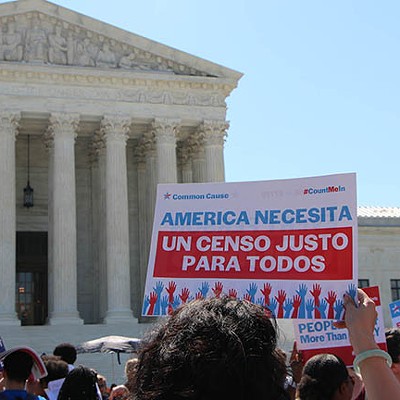Article 1, Section 2 of the United States Constitution mandates that a census of the population be taken every 10 years.
Demographer Dave Taylor, of the Pima Association of Governments, says there are three primary reasons for people to participate in the census in 2010.
"Knowledge, power and money," he states succinctly. "In an era of ever declining resources, the census information is central to identify where in the community those resources are needed."
Providing more efficient assistance to Tucson's homeless population could be one of those results.
Sitting in Santa Rita Park along 22nd Street on a sunny afternoon, Billy Ray Banks says that he's been coming to Tucson since 1957. Banks lives in a campsite near the park and indicates he'll participate in the census.
On the grass not far away, Mathew Cooper says he also sleeps near the park and has been in town for three years. He'll respond to the census, Cooper declares, if someone gets him a form.
To address situations like that of Cooper and Banks, Paul Fimbres, a local census office manager, explains there will be an outreach program to known homeless camps at the end of March.
Homeless people are just one of several groups that census-takers will be assisting in the coming weeks. Those who don't speak English are another.
"We have a number of strategies," Fimbres says of helping these people fill out the census forms. One is through assistance centers; another is hiring census-takers who speak their language.
Despite these efforts, some people will undoubtedly go uncounted. That reality has been a problem in Tucson since at least 1920, when estimates said that up to one-fifth of the population was missed.
"It will of course be a catastrophe if Tucson shows a population of 18,000 or 20,000," the Tucson Citizen editorialized in 1920, "... instead of 25,000, which is a conservative estimate of the actual number of people in the city limits."
The final figure came in around 20,000, and the undercount embarrassed some city leaders. It also helped shift the title of "Metropolis of Arizona" (Arizona's largest city), a distinction Tucson held since the establishment of the territory in 1863, to Phoenix.
This year, that title obviously won't be up for grabs. For most people, census forms will simply be mailed out beginning on March 15; people are asked to return them by April 1.
"Ten questions in 10 minutes," Taylor concludes of the census form that he thinks asks the most critical questions. These include name, birth date, gender, home ownership and race.
Taylor also says the dreaded census long form, which in the past went to one-sixth of households and could take up to an hour to complete, has been eliminated. It has been replaced with sampling under the American Community Survey program.
The constitutional reason given for the census is to apportion seats in the U.S. House of Representatives. This is the power Taylor refers to in his reasons for the enumeration.
"Since 1910, we've had 435 members of the House," Taylor says, "and Arizona will gain a seat this time around (because of the census)."
Taylor also thinks the census helps the nation address the social question of representative equality at many layers of government. But individuals' information, he stresses, isn't shared with those governments.
Sitting at a picnic table in DeAnza Park on Speedway Boulevard, Rob Robinson and Randy Garrett both say they don't have concerns about the census providing their information to law-enforcement agencies.
"I don't give a damn if they do," Garrett declares, "because they know it anyway."
Fimbres insists an individual's census information isn't given to law enforcement, or anybody else, and that under federal law, it's a crime to do so.
Robert Ellis Smith, editor of the Privacy Journal, thinks the U.S. Census Bureau has a "quite good" record of living up to its promise not to disseminate an individual's information.
"They have the best record in the federal government," Smith says, "and have built a tradition of confidentiality."
Taylor admits the census is an invasion of privacy. "You have to disclose something about yourself," he points out. "But it's a necessary compromise, to find out where growth has occurred ... while preserving people's rights."
Plus, Taylor says: "There's no risk (to participating in the census), because there's nothing (asked) about legality of residence or citizenship."
Taylor's third reason for participating in the census—money—has a couple of facets. The first is government revenue-sharing.
"(Local governments) get a large amount of money" based on census figures, Taylor says—around $1,000 in federal funds per person per year, and another $1,500 in state shared revenues.
"Over a decade," Taylor calculates, "that means a family of four is worth $100,000 (to local governments). If they are sending their tax money in, this way, we're getting back their fair share."
But money can also be saved if more people return their forms without requiring the local census office to send someone out to contact them. Fimbres says that the initial census participation rate 10 years ago was 64 percent.
Meanwhile, Tucson native Paul Lee sits outside downtown's Main Library. He's also homeless, sleeping near Mansfield Park on Sixth Avenue.
When shown the census survey and asked if he plans to participate, Lee responds immediately: "I'll try, and the questions are reasonable."












